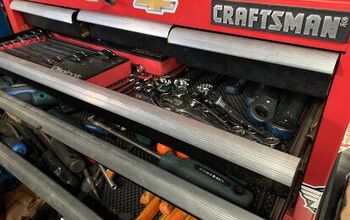Wikileaks Memo On German Reaction To GM's Decision To Keep Opel
The following is a “Confidential” memo from the US embassy in Berlin, leaked in the latest Wikileaks dump, describing German reaction to GM’s flip-flop decision to not sell its German subsidiary, Opel. The memo reveals that Germany saw GM as a “unreliable partner” and that at least one German government official believed that “if the U.S. Government had GM under better control, this would not have happened.” The document also confirms that GM scuttled the deal largely over concerns about Russian access to its intellectual property, and that Opel may well have been happy to see the deal fall apart rather than face losing its entire BMW supply business. Though none of this information is completely new, the leaked document provides a fascinating insight into the muddled mess that was the Opel rescue.
BERLIN 00001395 001.2 OF 002
Classified By: ECONMIN Robert A. Pollard for reasons 1.4 (b,d).
1. (C) Summary: Just hours after Chancellor Merkel’s historic November 3 address to a joint session of Congress, General Motors (GM) canceled its sale of Opel to Canadian auto parts manufacturer Magna. The decision, which followed repeated assurances from GM that it was a done deal, came as a complete shock in Germany and dominated media coverage throughout the day. Merkel herself was reportedly highly upset over GM’s flip flop. Ulrich Wilhelm, the Chancellor’s spokesman on Opel said the German government “regretted” the decision, and reminded GM that it must now repay Berlin’s 1.5 billion bridge loan to Opel by the end of the month, while FDP Economics Minister Rainer Bruederle described GM’s action as “totally unacceptable.” The cabinet was expected to discuss the GM move on November 4. Opel’s labor unions, which had strongly backed the Magna sale because of its promise to save jobs and keep plants open, announced that workers would withdraw all concessions made under the terms of the Magna deal and start a general strike at Opel plants on November 5. While anger is widespread, there are already some voices outside the government advocating acceptance of GM’s announcement as the only viable alternative to a total collapse of Opel. End Summary.
Germany’s Political Establishment Reacts with Anger
2. (C) Opinion across the political spectrum has been uniformly negative. FDP Economics Minister Rainer Bruederle blasted GM’s behavior as “totally unacceptable.” Juergen
3. (C) Jochen Homann, the Economic Ministry State Secretary heading the German interagency working group on Opel, told EMIN on November 4 that there was no possibility of further German financial assistance to Opel in the foreseeable future. The failure of the Magna deal and GM’s reputation as “an unreliable partner” would likewise complicate negotiations with other governments seeking to preserve Opel jobs and factories. Although no one directly blamed the USG, the Germans are still having trouble understanding how GM could act independently of Washington. Dr. Schubert, one of Homann’s lieutenants, complained to the Embassy that “if the U.S. Government had GM under better control, this would not have happened.” It is now up to GM, he said, to submit a new restructuring and financing plan, as their previous one is out of date. Schubert was adamant that this time “there will be no special treatment for Opel” and GM’s plan would have to go through normal channels.
Matched by Threats from Organized Labor
4. (SBU) Klaus Franz, the head of Opel’s Works Council, announced on November 4 that Opel’s 25,000 employees in Germany will begin an indefinite strike on November 5 to
5. (C) Oliver Burkhardt, head of the Metal Workers in NRW, likewise condemned the decision as “bold and unfriendly,” not only to Opel employees, but to the German government.
While Despair Permeates Opel Executives
6. (C) Opel managers such as Berlin Representative Uwe Berlinghoff, who almost uniformly favored the Magna contract, were also “taken completely by surprise” by the GM announcement. Berlinghoff now expects GM to resurrect its pre-Magna restructuring plans, including closure of plants at Bochum (and Antwerp, Belgium) and the sale or closure of the Eisenach plant. Berlinghoff also expected the German government to cancel the expected 4.5 billion dollar loan guarantee package, as “GM has demonstrated its lack of credibility with German politicians.”
Research and Development and IPR Could be Key
7. (C) German auto industry insiders have privately identified compelling reasons why GM cancelled the Magna deal. Among these are the importance of the GM/Opel Research and Development facility in Ruesselsheim and its patents to GM’s development of small efficient cars in Europe, the U.S. and elsewhere. GM was also reportedly skeptical that it could adequately protect crucial IPR from Russian exploitation because of the Sberbank/Gaz partnership with Magna. Moreover, Magna had oversold its ability to penetrate
But Auto Leader Welcomes the Move
8. (C) Dr. Norbert Reithofer, the CEO of BMW, told the Ambassador on November 4 that GM’s move would be welcomed by the German auto industry. Reithofer was adamant that there was no way BMW and the other German auto manufacturers would have purchased auto parts from Magna once it became a direct competitor as an auto manufacturer. In Reithofer’s view, Magna made the Opel purchase proposal in a moment of panic at the height of the economic crisis, but now that a recovery is in the offing, probably is not unhappy to see it dissolve.
Comment
9. (C) Despite the considerable German ire aimed at GM, much of it is aimed at GM’s handling of Opel (in particular the timing of the November 3 announcement), rather than its
More by Edward Niedermeyer
Latest Car Reviews
Read moreLatest Product Reviews
Read moreRecent Comments
- 3SpeedAutomatic 2012 Ford Escape V6 FWD at 147k miles:Just went thru a heavy maintenance cycle: full brake job with rotors and drums, replace top & bottom radiator hoses, radiator flush, transmission flush, replace valve cover gaskets (still leaks oil, but not as bad as before), & fan belt. Also, #4 fuel injector locked up. About $4.5k spread over 19 months. Sole means of transportation, so don't mind spending the money for reliability. Was going to replace prior to the above maintenance cycle, but COVID screwed up the market ( $4k markup over sticker including $400 for nitrogen in the tires), so bit the bullet. Now serious about replacing, but waiting for used and/or new car prices to fall a bit more. Have my eye on a particular SUV. Last I checked, had a $2.5k discount with great interest rate (better than my CU) for financing. Will keep on driving Escape as long as A/C works. 🚗🚗🚗
- Rna65689660 For such a flat surface, why not get smoke tint, Rtint or Rvynil. Starts at $8. I used to use a company called Lamin-x, but I think they are gone. Has held up great.
- Cprescott A cheaper golf cart will not make me more inclined to screw up my life. I can go 500 plus miles on a tank of gas with my 2016 ICE car that is paid off. I get two weeks out of a tank that takes from start to finish less than 10 minutes to refill. At no point with golf cart technology as we know it can they match what my ICE vehicle can do. Hell no. Absolutely never.
- Cprescott People do silly things to their cars.
- Jeff This is a step in the right direction with the Murano gaining a 9 speed automatic. Nissan could go a little further and offer a compact pickup and offer hybrids. VoGhost--Nissan has laid out a new plan to electrify 16 of the 30 vehicles it produces by 2026, with the rest using internal combustion instead. For those of us in North America, the company says it plans to release seven new vehicles in the US and Canada, although it’s not clear how many of those will be some type of EV.Nissan says the US is getting “e-POWER and plug-in hybrid models” — each of those uses a mix of electricity and fuel for power. At the moment, the only all-electric EVs Nissan is producing are the Ariya SUV and the perhaps endangered (or maybe not) Leaf.In 2021, Nissan said it would make 23 electrified vehicles by 2030, and that 15 of those would be fully electric, rather than some form of hybrid vehicle. It’s hard to say if any of this is a step forward from that plan, because yes, 16 is bigger than 15, but Nissan doesn’t explicitly say how many of those 16 are all-battery, or indeed if any of them are. https://www.theverge.com/2024/3/25/24111963/nissan-ev-plan-2026-solid-state-batteries


































Comments
Join the conversation
I, for one, am very happy to see Wikileaks reveal this type of information. The US Government has been acting on our behalf while telling citizens one story and doing something different. It is time for the Government to work FOR the people again, I am looking forward to their revelation of a certain US Bank's crooked business operations. It is time for the US Government and US Businesses to live up to the ideals of America - not being the cheating bullies of the world that they have become.
"... Opel may well have been happy..." I think you mean Magna instead of Opel.